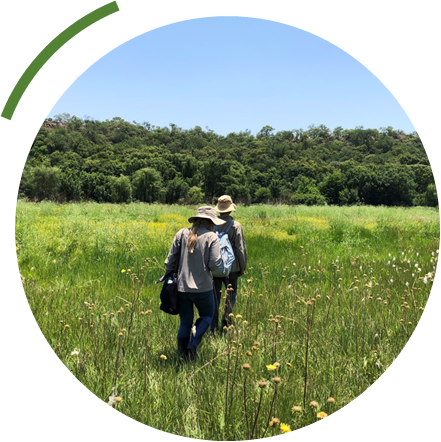Biodiversity and Nature
Ecological Services: Undertaking Ecological Studies to Support the Business’ Nature Integration
The Digby Wells’ ecological services division is dedicated to the robust assessment, management, and protection of nature across all phases of development. By integrating defensible scientific methods and Good International Industry Practice (GIIP), we endeavour to ensure that our team of ecologists, consultants and economists adequately assess the composition, functionality, and structure of each of the respective realms of the natural world, including freshwater (i.e. rivers, streams, and/or wetlands) and terrestrial ecosystems across the landscape.
The outcomes from these studies help to provide both site and regional context, as well as inform the significance of the identified sensitivities (if any), which in turn requires appropriate mitigation actions and implementation-ready biodiversity management plans.

The importance of our work is emphasised by the need for legislative compliance with national regulatory frameworks within host countries and/or alignment with requirements for lender institutions, including Equator Principles, the International Finance Corporation’s Performance Standard 6, as well as other sector-specific sustainability standards (High Conservation Value approach). While these standards outline best practice guidance for biodiversity conservation and the sustainable management of living natural resources, there are various notable drivers of change within the current market. Most notably, the Kunming-Montreal Global Biodiversity Framework (GBF), adopted at the Convention of Parties (COP-15) in December 2022, commits member states and governments across the world to conserve biodiversity, sustainably optimise the use of natural resources, and benefit-sharing toward indigenous communities and indirectly, the wider society.
On the other hand, the Taskforce on Nature-related Financial Disclosures (TNFD) is a disclosure guidance framework that facilitates a deeper understanding of nature-related business issues within the private sector. The basis for the framework is an acknowledgement that nature is the foundation for innumerable provision of benefits in the form of natural resources (i.e. species, ecosystems, and genes) and ecosystem services, which a significant proportion of businesses rely on to be sustainable into the future. Adhering to these standards, as well as national legislation, ensures that our projects simultaneously contribute positively to global biodiversity goals and enable our clients to achieve their business objectives into the future.

Terrestrial Biodiversity Assessments
- Flora and fauna baseline assessment surveys and monitoring;
- Protected species assessments and conservation plans (incl. chimpanzee, grass owls, etc.);
- Permit applications for protected flora rescue and relocation;
- Veld condition assessments in support of grazing capacity studies;
- Alien Invasive Species (AIS) management and removal; and
- Nursery and game Management, including species translocation design and implementation.

Biodiversity Stewardship and Strategy Development
- Development of Biodiversity Policy and Strategy;
- Biodiversity Best-practice Benchmarking;
- Biodiversity Action/Management Plans (BAPs / BMPs);
- Critical Habitat Assessments;
- Ecosystem Services Assessments;
- Residual impact assessments using natural capital evaluation methodologies;
- Biodiversity offset planning, reporting and monitoring;
- TNFD Gap Analysis, education and nature scenario analysis;
- Optioneering and sensitivity assessment for citing of major infrastructure; and
- Biodiversity Metric Development.
Aquatic Ecological Assessments
- Aquatic biomonitoring for compliance monitoring;
- Aquatic ecological baseline and impact assessments;
- Environmental flow (eFlows) assessments for downstream water requirements;
- Connectivity assessment and fishway design;
- Metal bioaccumulation and edibility assessments;
- Facilitation of environmental DNA (eDNA) sampling and training; and
- Diatom assemblage analysis, toxicity testing (using the DEEEP approach) and water quality.

Specialist Wetland Assessments
- Wetland and riparian habitat delineation and classification;
- Wetland integrity assessment and functionality assessment of Ecosystem Services,
- Ecological Importance and Sensitivity (EIS);
- Wetland impact assessments and management plans;
- Wetland offset strategies and offset implementation; and
- Wetland rehabilitation and monitoring plans (incl. Recommended Ecological Category); and
- Constructed wetlands for passive water treatment.

We constantly seek to exceed industry standards and deliver exceptional results, evident in our tailored approaches to aquatic and wetland biomonitoring, protected plant permitting assessments, targeted species reconnaissance surveys, developing and implementing Biodiversity Management and/or Action Plans, and formulating pragmatic corporate commitments in the form of nature policies, strategies and standards. To further ensure innovation and a holistic approach, the ecological services team strives to collaborate closely with other teams within the Company, specifically the social engagement teams, in pursuit of understanding the community elements supporting local biodiversity and service provision, the geospatial and remote sensing specialists in support of understanding catchment-level impacts, the rehabilitation and closure experts as we aim to ensure longevity of the proposed management measures, as well as our sustainability practitioners to assure the relevance and alignment of actions in relation to the market expectations. By choosing our services, Clients can be confident in a service-provider that is committed to excellence and sustainability, as well as adding value in the form of pragmatic and effective solutions.













